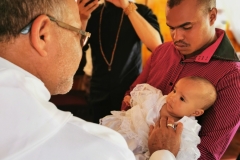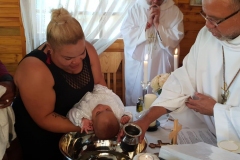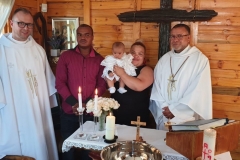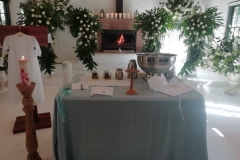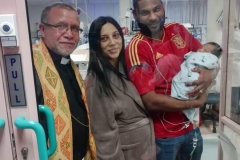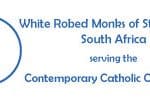A Gate to the Kingdom and Ourself
Christ is the sacrament of our encounter with God. It is through Baptism that we solemnly enter the Kingdom of Light and formally wash away our darkness, entering solemnly the Light. We recognize that which we always have been and are: Light.
Through holy baptism we are made members of the one Body of Christ. As members of that Body, we are intimately related, members of one another in his Mystical Body. (Eph 4:1ff; 4:25).4 Such formal solemnity on the surface requires a conscious understanding and appreciation of one’s own human hood.
Infant Baptism, The People of God Speaks for the Infant
Regarding infant baptism: an infant surely cannot engage any rational act. The Church, the collective whole, The People of God, maintains and awakens faith in the name of the infant. Moreover, the Church requests, as condition for permitting the baptism, an assurance that the parents will raise the child to appreciate his or her own humanity in Love and Compassion.
Christ in the Church calls the child to the response of Love and Compassion. The Church in her own solemn and sacred formulas pronounces Love and Compassion in the name of the infant. The Church, specifically parents and Godparents, assume the responsibility in appropriate moments, for making the child aware of the graces and duties committed to him or her in the sacraments, Baptism, specifically. The child consciously awakens to itself as Love and Compassion, as a child of light, as Light.
A Brief History of Baptism
From Catholicism by Fr. Richard P. McBrien (San Francisco: Harper, 1994. ISBN 0-06-065405-8, pp. 802-822) we find the following:
Baptism: Pre-Christian Ablutions and Baptism
There were already many different kinds of ritual acts in Judaism, including those practiced by the Qumran sect, or Essenes. There were purification rites associated with food preparation and diet, and there were initiatory rites associated with water. This practice of “proselyte baptism (by which Gentiles became Jews) seems to have developed with the expansion of Judaism outside Palestine.
It had three phrases: instruction concerning Judaism’s persecuted condition and the commandments of the Law, circumcision for males, and a water bath for all. The central element of its ritual process was circumcision, by which solidarity was established with the holy nation of kings and priests (Ex 19:6). Gradually, the water bath began to absorb the initiatory aspects of circumcision, and finally displaced it altogether. By the Christian era, therefore, proselyte baptism had assumed an increasingly initiatory rather than purification character.
This is not to suggest that Christian baptism was derived from proselyte baptism. What evidence there is leads us to conclude, on the contrary, that Christian baptism was patterned after the baptism of Jesus by John the Baptism in the Jordan river. There is no hint of a death-resurrection theme, no initiatory motif, no notion of admission to a new community. The emphasis is instead upon repentance as a preparation for messianic work.
John’s baptism was also a baptism in water. It would give way to another baptism in water and the Holy Spirit (Mt 3:11; Lk 3:16). John himself regarded his baptism as a temporary rite. In submitting to it, Jesus established his solidarity with those who were objects of John’s preaching, the faithful remnant of Israel.
What is the Fee for charge for Sacramental Services?
We do not, on principle, maintain fees for our sacramental services (Baptism, Marriage, etc.) Financial donations may be offered to assist in sustaining and furthering our ministry. Money is never an issue as we do not deny the sacraments to anyone. Whatever donation is offered will be gratefully accepted. If a priest/deacon is required to travel great distances to celebrate the sacrament with you, we would appreciate having those traveling costs covered. Donations permit The White Robed Monks of St. Benedict to carry out sacramental, charitable and educational missions and activities. For more information, please refer to FAQs re Baptism. To move forward, please contact us to determine a date and then please complete and submit via the web a Baptism Petition.


